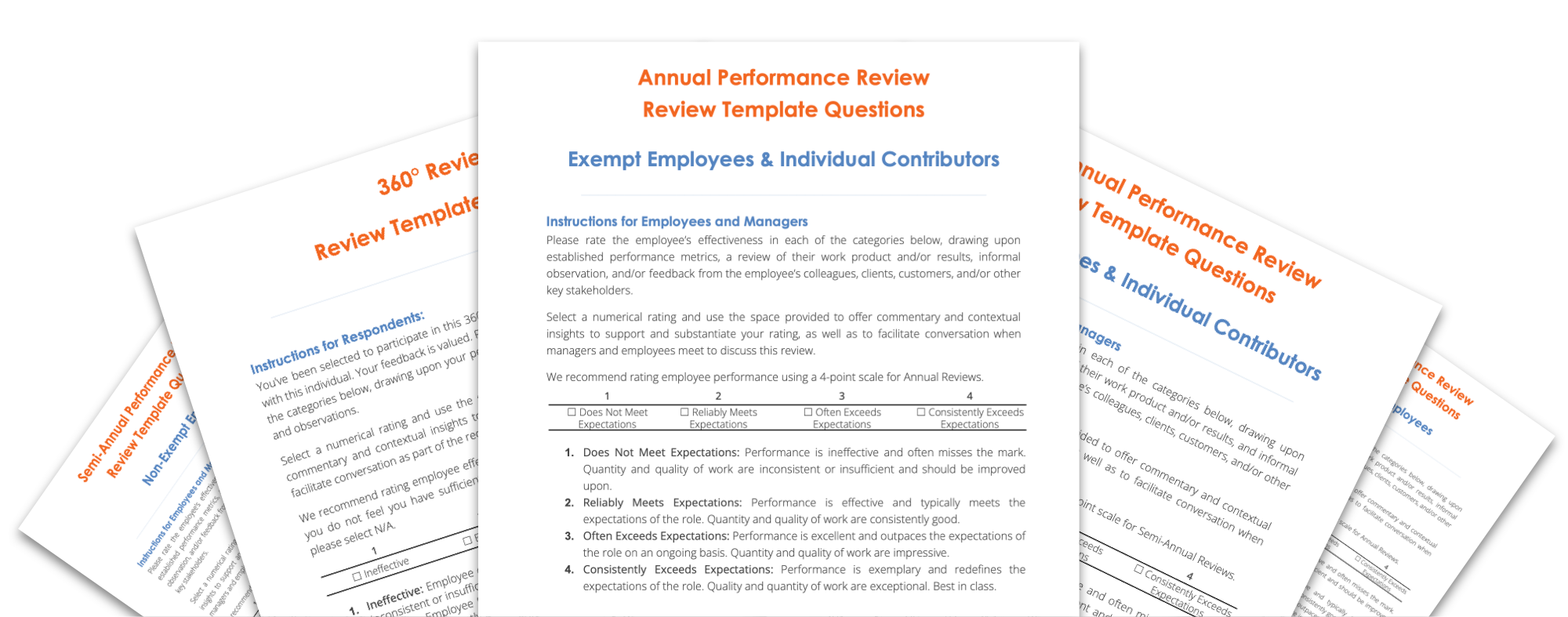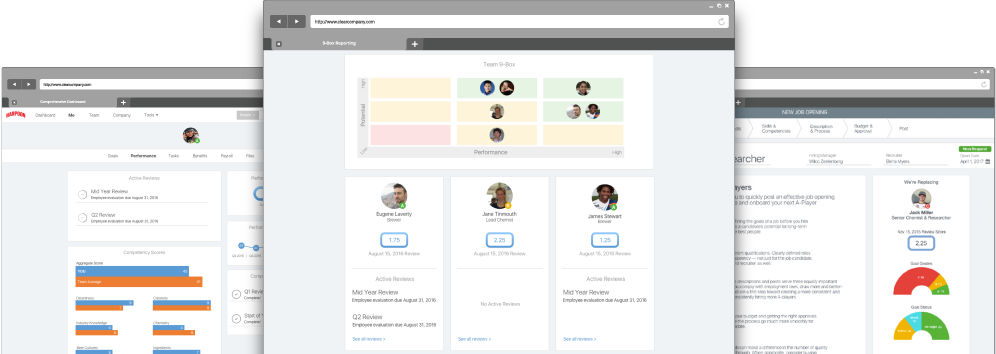This article is Part 3 in a three-part series with Erin Riska, SHRM-CP and HRCI -PHR, Performance Management Strategic Advisor to ClearCompany. Riska is the founder of Search & Rescue, LLC, a concierge consulting company offering integrated talent services, including performance management program design, recruitment process outsourcing, career coaching, and job-search strategy and support. A longtime people operations professional, Erin offers over 15 years of experience in human resources, performance management, talent acquisition, and training and development, working in partnership with companies, HR and people leaders, and candidates alike. If you’ve been following along with our three-part expert series delving into best practices for employee performance reviews, you’ll remember that in Part 1, we covered general best practices and recommendations for performance rating scales. We also touched on the importance of performance reviews for managers. In Part 2, we talked about best practices for reviewing the performance of exempt and non-exempt employees.
Now, in Part 3, we’re diving deeper into performance reviews for managerial employees and people leaders. Due to the complexities of managers’ roles, their performance reviews are complex as well. But, with some help from the ClearCompany experts and our expert-built review templates, you can conduct effective managerial reviews.
Managers are employees, too, and that means they need effective #PerformanceReviews. Check out best practices for managers’ performance reviews from @ClearCompany —plus, get 5 expert-built performance review templates:Managers are Employees, Too
Management positions are multi-faceted, as Riska points out. Their function is likely perceived differently by different parts of the business:
- Executive leadership views managers as primarily revenue-drivers
- Peers see them as collaborators, coaches, or even competition
- Direct reports see them as mentors and role models
Managers play an integral role in helping their teams perform, grow, and succeed. They serve as liaisons between their teams and leadership and as advocates for their direct reports. They also have a huge impact on employee engagement and retention: according to Gallup, 70% of the variance in team engagement levels can be attributed to managers. 52% of employees leaving their organization said their manager or company could have done something that would have made them stay.
It’s clear that managers are extremely influential in their organizations. But because of the many different aspects of their roles, it can be easy to forget that managers are not just managers — they’re employees, too. That means they benefit from effective performance management and feedback just as much as any other employee.
An obvious but often overlooked fact is that managers are also employees, and as such, they derive every bit as much benefit from a robust approach to performance evaluation and professional development as any other employee.”
- Erin Riska, Performance Management Strategic Advisor to ClearCompany
Riska points out that performance evaluations are especially necessary for new managers because often, they are high-performers who were promoted because of that quality. “Instead — and somewhat paradoxically — these same people may struggle when leading because they find it difficult to separate themselves from what they’re best at — doing,” said Riska.
For both new managers adjusting to their roles and seasoned, long-time supervisors, performance reviews give them the opportunity to receive constructive feedback, develop new knowledge and skills, participate in leadership coaching, and set goals for the future. Don’t skip critical managerial performance appraisals — use them to develop leaders who are engaged, empathetic, and empowered.
How to Measure Managerial Performance
Riska and the ClearCompany experts broke down the qualities that make an effective people leader:
- Taking an interest in their employees and making an intentional effort to be inclusive
- Casting a vision that instills confidence, inspires purpose, and aligns objectives
- Communicating expectations clearly and evaluating performance consistently
- Coaching employees to improve performance and/or pursue professional development
- Achieving results, including increased impact, productivity, and/or profitability
These are the criteria our experts used to guide the development of our ready-to-use (and completely customizable) manager performance review templates. They recommend rating managers’ performance using a three-, four-, or five-point scale based on ten main competencies:
- Organizational Leadership
- Coaching
- Collaboration
- Decisiveness
- Impact
- Inclusivity
- Innovation
- Interpersonal Skill
- Influence
- Problem-Solving
Our performance management experts also advise incorporating qualitative questions in addition to quantitative ratings. Here’s an example of a qualitative question that helps gauge managers’ effectiveness:
How would you evaluate the manager’s commitment to continuous improvement and/or professional development in the course of the review period? In what ways have you observed growth, development, and/or improvement on the part of the manager and/or the team they lead?
The qualitative questions included in ClearCompany’s manager performance review template are “designed to assess their efficacy as people leaders as well as the success of the teams they lead,” said Riska. As evidenced by the sample question above, not all managerial duties can be quantified. So, for most managerial reviews, it’s necessary to include a selection of open-ended questions.
360-degree reviews are another useful review format to measure managers’ performance. 360 reviews give the manager’s peers and direct reports a chance to give feedback, offering perspective and insight that leadership doesn’t have. This review type creates a more complete picture of managers’ performance and contributes to a more impartial evaluation process.
Twice-annual #PerformanceReviews and 360-degree reviews are effective tools for measuring managerial performance. Brush up on more best practices for manager reviews in @ClearCompany’s latest:Two Reviews Annually: Evaluation and Goal-Setting
We often think of the traditional annual performance review when we think of evaluating employees. But only 14% of employees say that annual reviews inspire improvement, and just 28% of CHROs say they accurately reflect all of an employee’s contributions. Annual reviews can do more harm than good, leaving employees feeling upset and discouraged.
That’s why Riska and the ClearCompany experts recommend a performance review process that includes at least twice-yearly reviews. That way, any areas for improvement can be identified and addressed sooner and great work recognized in a more timely manner. Not to mention, employees want more frequent feedback, and it boosts engagement and motivation.
“Our review templates are designed for both annual and semi-annual use to support ongoing conversation and collaborative coaching regarding the composition of the manager’s team, the relative strengths and areas of struggle of each member, succession planning, and strategic goals, as well as any additional resources the manager may need,” said Riska.
Using both mid-and end-of-year reviews gives managers a chance to have their progress evaluated and set new goals for the year ahead. This takes the pressure off of the reviewer to remember every accomplishment and offer feedback on every error from the past year in one short meeting. The manager being reviewed benefits from the separation of conversations about past performance and plans for the future.
Here’s an example of a “future-focused capstone question” you might ask managers when discussing their goals (that’s also included in our expert-built review template):
What are the manager’s “conspicuous struggles?” What prevents them from being one of the very best people leaders in the company?
There’s no doubt that performance reviews for managers are a vital part of performance management strategy. Managers have a tremendous impact on the success of each of their team members, lend support to their colleagues, and make irreplaceable contributions to business success. Their management styles create their team’s work environment, shape company culture, and influence employee engagement.
In return for all they do, give managers at your organization performance reviews that count. Get started by downloading five pre-built performance review templates created by performance management advisor Erin Riska and the experts at ClearCompany, including:
- Semi-Annual Review Template for Exempt Employees
- Annual Review Template for Exempt Employees
- 360-Degree Review Template


